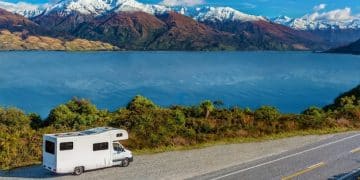Long-term travel lifestyle: your guide to freedom

A long-term travel lifestyle involves planning effectively, managing finances, staying organized, and immersing yourself in local cultures to enhance your experiences while adapting to life on the road.
When you think about a long-term travel lifestyle, what comes to mind? For many, it’s a dream filled with adventure and exploration. Imagine waking up in a new city each day, embracing diverse cultures, and savoring authentic cuisine. This article explores how you can turn that dream into reality.
Understanding the long-term travel lifestyle
Understanding the long-term travel lifestyle can transform your perspective on life and travel. It’s not just about visiting new places; it’s about embracing freedom and exploration over an extended period. Imagine living out of a suitcase, visiting different cultures, and making friends across the globe. This lifestyle offers a unique way to experience the world and can lead to extraordinary memories.
What Does It Mean?
A long-term travel lifestyle typically involves traveling for months or even years. It’s about immersing yourself in various cultures rather than just skimming the surface. Here are some essential aspects:
- Staying in one place long enough to feel at home.
- Understanding local customs and traditions.
- Building relationships with locals and other travelers.
- Gaining new skills through immersive experiences.
Many people are drawn to this lifestyle for different reasons. Some seek adventure, while others desire personal growth or a break from routine. The key to starting your journey is to define what you want to achieve.
Benefits of Long-term Travel
A significant advantage of the long-term travel lifestyle is the opportunity to learn continuously. You can dive deep into languages, art, and history, which enriches your understanding of the world. Moreover, you can develop flexibility while adapting to new situations and challenges.
Additionally, this lifestyle can help you rethink your priorities. Spending extended periods away from home forces you to consider what truly matters, be it experiences, friendships, or personal well-being. Ultimately, the journey shapes who you are.
Adopting a long-term travel lifestyle isn’t without its challenges, though. It’s essential to manage your finances wisely, plan ahead, and stay organized. This approach ensures that you can travel comfortably without worrying constantly about your budget.
Planning your adventures effectively

Planning your adventures effectively is crucial for a successful long-term travel lifestyle. A well-thought-out plan helps you maximize your experiences while minimizing stress. By organizing your travels, you can focus more on exploration and enjoyment rather than logistics.
Set Clear Goals
Before diving into the details, start with clear goals for your travels. Ask yourself what you want to achieve during your journey. These goals can be:
- Experiencing new cultures.
- Learning a new language.
- Trying different cuisines.
- Meeting new people.
Once you set your goals, you’ll find it easier to plan your adventures. Knowing your motivations can guide decisions about destinations and activities.
Research Your Destinations
Effective travel planning involves thorough research. Consider factors like climate, local customs, and popular attractions. Use online resources, travel blogs, and forums to gather insights. Additionally, familiarize yourself with transportation options and accommodations in advance to avoid surprises.
Creating a travel itinerary can help you stay organized. However, leave room for spontaneity. Some of the best memories come from unexpected adventures, so allow flexibility in your plans.
Another critical element is budgeting for your travels. This includes accommodations, meals, activities, and transportation. Knowing your budget will help you make informed choices throughout your journey.
Stay Organized
Using apps and tools for organization can streamline your planning process. Consider apps that help with:
- Itineraries and scheduling.
- Budget tracking.
- Accommodation booking.
- Travel journaling.
Keeping everything in one place saves time and reduces stress. By maintaining organization, you can dedicate more time to enjoying your adventures.
As you plan your adventures, remember to remain adaptable. Travel is unpredictable, and challenges will arise. Embrace the unexpected and find joy in every moment of your long-term travel lifestyle.
Managing finances during extended travel
Managing finances during extended travel is vital for a successful long-term travel lifestyle. Without proper budgeting and planning, unexpected expenses can create stress and impact your adventures. Understanding how to manage your finances will help you enjoy your journey without worry.
Set a Travel Budget
Creating a realistic travel budget is the first step. Determine how much money you have for your trip and how long you plan to travel. Break down your budget into categories:
- Accommodation costs.
- Daily expenses such as food and transportation.
- Activities and experiences.
- Emergency fund for unexpected situations.
This structured approach allows you to allocate funds wisely and avoid overspending.
Monitor Your Expenses
Tracking your expenses is critical while traveling. Keeping a record helps you stay within your budget. Use apps or a simple notebook to jot down your daily spending. This practice allows you to see where your money goes and adjust accordingly.
One useful tip is to categorize your expenses. For example, separate food costs from accommodation. This way, you can identify areas where you can cut back if needed. Staying aware of your financial situation will make your trip smoother.
Find Affordable Accommodation
Accommodation can take up a significant portion of your budget. Consider various options to save money. Staying in hostels, using platforms like Airbnb, or house-sitting can lower your costs.
Also, look for long-term rental deals. Many property owners offer discounts for extended stays. This approach can provide both savings and a more comfortable living situation during your travels.
Work While Traveling
Another effective strategy is to find work while traveling. Many travelers choose to pick up temporary jobs or freelance opportunities. This can help fund your adventures while allowing you to immerse yourself in local culture.
Common options include teaching language classes, working in hostels, or offering services like photography or graphic design. By combining work with travel, you can sustain your long-term travel lifestyle without depleting your savings too quickly.
Tips for adjusting to life on the road

Adjusting to life on the road is an essential part of embracing a long-term travel lifestyle. While the freedom of travel is exciting, it can also bring challenges. Knowing how to adapt can enhance your experiences and make your journey more enjoyable.
Embrace Flexibility
Flexibility is key when living on the road. Plans can change, and unexpected situations may arise. Learning to go with the flow will help you manage stress. Instead of sticking rigidly to your itinerary, be open to new opportunities.
This might mean extending a stay in a place you love or changing destinations based on recommendations from fellow travelers. Keeping an adaptable mindset allows you to fully enjoy the journey.
Stay Connected with Home
While traveling, it’s important to keep in touch with family and friends. Regular communication can alleviate feelings of homesickness and help maintain your support network.
Using video calls, social media, or even postcards can keep relationships strong. Sharing your experiences with loved ones helps them stay involved in your adventures, making the journey more meaningful.
Establish a Routine
Having a routine can provide comfort while traveling. This doesn’t mean you need a strict schedule, but establishing certain habits can help you feel more grounded.
- Set aside time for daily exercise, like walking or yoga.
- Plan regular meal times to maintain energy levels.
- Create a morning or evening ritual, like journaling or reading.
- Designate days for organizing your finances or planning for the next leg of your trip.
A flexible routine helps you retain a sense of normalcy amidst the excitement of travel.
Stay Organized
Keeping your possessions and travel documents organized is crucial for life on the road. Use packing cubes or bags to categorize your items, making it easier to find what you need quickly.
Consider using digital tools for managing itineraries and bookings. Apps for tracking expenses can simplify the financial aspect of your travels. By staying organized, you can minimize stress and make informed decisions about your journey.
Embrace Local Culture
Adapting to life on the road also means immersing yourself in local cultures. Take the time to learn a few phrases in the local language or try local foods. Participating in cultural activities can deepen your understanding of the places you visit.
Joining community events and connecting with locals can lead to unique experiences. These interactions enrich your journey and help you feel more connected to the places you explore. Remember, the culture you encounter can offer valuable insights and inspirations.
In summary, embracing a long-term travel lifestyle is an exhilarating journey filled with adventures and discoveries. By being flexible, staying organized, and immersing yourself in local cultures, you can create lasting memories. Remember to keep in touch with those at home and manage your finances wisely. Adjusting to life on the road may come with challenges, but the experiences you gain will be well worth it. With the right mindset and preparation, every trip can lead to personal growth and unforgettable moments.
FAQ – Frequently Asked Questions about Long-Term Travel Lifestyle
How can I ensure financial stability while traveling long-term?
Create a detailed budget, track your expenses, and look for opportunities to work while traveling to maintain financial stability.
What are some tips for staying connected with friends and family while traveling?
Regularly schedule video calls, share your experiences on social media, or send postcards to keep your loved ones involved in your journey.
How do I adjust to a new location quickly?
Embrace flexibility, make a simple routine, and engage with local communities to help adapt to new environments quickly.
What should I consider when choosing accommodations?
Consider location, cost-effectiveness, and amenities. Look for options like hostels, Airbnb, or long-term rentals for better rates.





